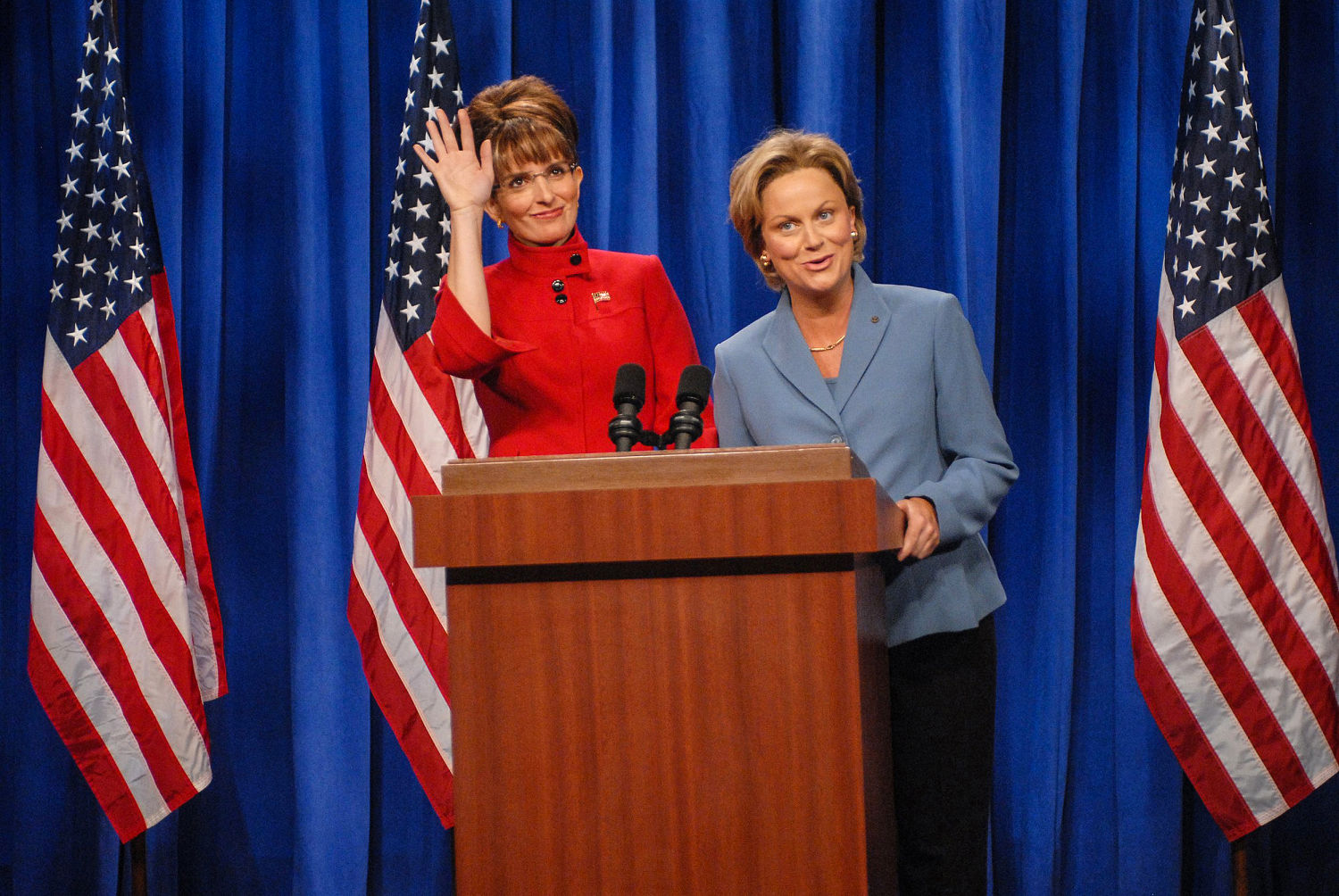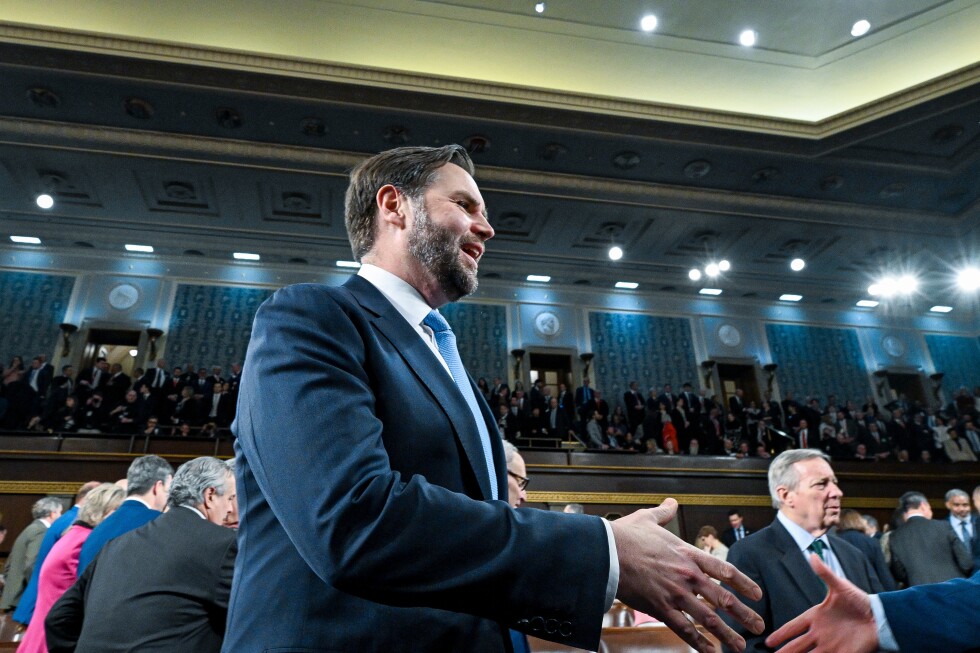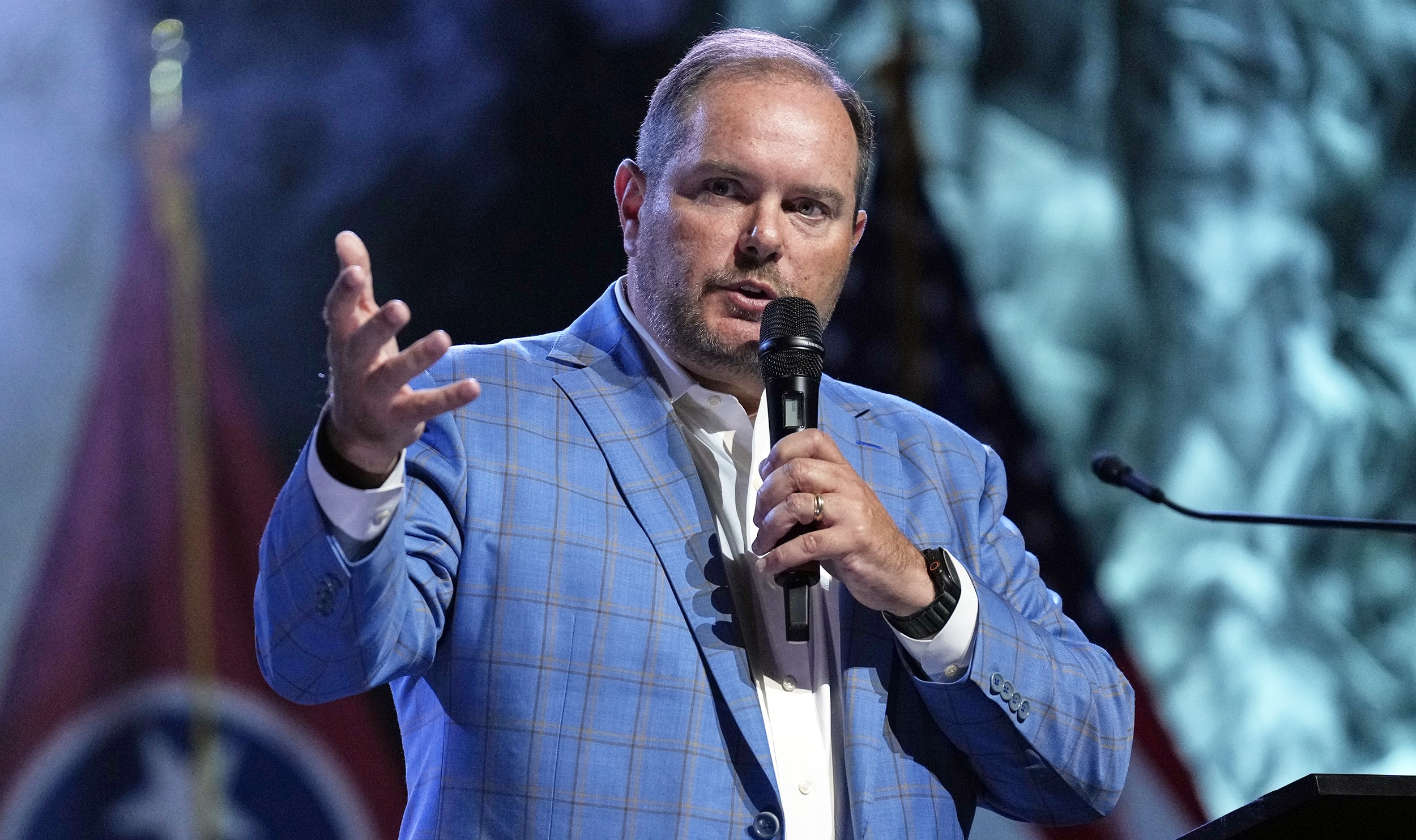The Dictatorship
The complicated political legacy of ‘Saturday Night Live’

In a book released next week, “Saturday Night Live” executive producer Lorne Michaels addresses the show’s politics, saying “SNL” has never favored liberals or conservatives. “It’s the hardest thing for me to explain to this generation that the show is nonpartisan,” Michaels is quoted as saying in “Lorne: The Man Who Invented Saturday Night Live” by Susan Morrison. “We have our biases. We have our people we like better than others, but you can’t be Samantha Bee.”
Michaels’ insistence on impartiality will likely bring howls from conservatives, who have complained for decades that “SNL” has been a liberal viper pit, mocking right-wingers and taking it easy on the icons of the left.
‘It’s the hardest thing for me to explain to this generation that the show is nonpartisan,’ Michaels is quoted as saying.
In 2019, after the show ran a sketch satirizing one of his press conferences on border policy, President Donald Trump lashed out at its “Republican hit jobs,” vowing “retribution” for making fun of him. Over the years, conservatives have called for the show to be “put out of its misery” because of its political slant, suggesting the executive producer is either “stupid or a liar” for claiming the show is nonpolitical.
And progressives, of course, see “SNL” as their own playground. In a 2003 interview, then-head writer Tina Fey told a reporter“We have a liberal bias, obviously,” and her fellow progressives have never doubted her. This is why, when the show steps out of line and allows anti-woke celebrities like Shane Gillis to host, “SNL” fans react with horror — after Gillis’ hosting gig in 2024, one comedy writer said Michaels was “unfit … to run a major network show in 2024.”
“SNL” was forged in the post-Watergate leftism of the 1970s, an era when politicians were viewed with heightened scrutiny and distrust. Michaels and young progressive writers like Al Franken and Chevy Chase drove the show’s political conscience. Three days before the 1976 Jimmy Carter-Gerald Ford election, the show simply replayed the speech in which Ford announced he would be pardoning Richard Nixon, which Michaels later listed as one of his proudest moments as the producer of the legendary comedy show.
But despite “SNL’s” progressive roots, a full review of the show’s history (which I have undertaken as part of a two-year podcast project called “Wasn’t That Special”) uncovers some truly inspired moments of traditional political conservatism.
In the show’s first sketch after Trump’s election in 2016, comedian Dave Chappelle’s character attends an election night party filled with fellow progressives. As the sketch proceeds, Chappelle’s white, New York City-based friends grow increasingly incredulous as election night progresses and Trump keeps winning states. Chappelle’s character, by contrast, simply laughs at how naive his liberal friends had been throughout the election year.
To conservatives, the sketch was an admission by the show that it had been operating in a liberal bubble, unable to see why support for Trump had been growing over the past year.
Or take, for example, a 1990 “Weekend Update” desk bit in which Chris Rock complains both about how much he hates taxes and how he doesn’t mind if prisons are uncomfortable for the inmates. (“Jails are so nice, they come back twice. … They don’t have this problem in Iran because it’s hard to snatch another purse if you don’t have another hand.”) A year later, Rock returned to support the nomination of Clarence Thomas to the U.S. Supreme Court, accusing him only of the crime of using bad pickup lines in the workplace.
An array of recurring characters in the show have mocked progressive activism. Eddie Murphy played a recurring character named Tyrone Green (first introduced in the famous “Prose and Cons” short film), an illiterate, poetry-writing prisoner who was regularly feted by New York’s rich elite. The whole series of sketches, in which rich progressives are harshly lampooned, has a strong Tom Wolfe-ean “Radical Chic” vibe to it.
Sure, the show famously took joyous whacks at Sarah Palin, but that’s because Sarah Palin is a ridiculous person.
The show also had a particular sore spot for public sector employees. In March 2001, Maya Rudolph portrayed a sassy postal worker who has no time for customers, lending comfort to those who think customer service improves when privatization reigns. In 2010, a brutal sketch featured the “Public Employee of the Year Awards,” in which government workers were given awards for being surly and amassing outlandish benefits packages.
Sure, the show famously took joyous whacks at Sarah Palin, but that’s because Sarah Palin is a ridiculous person. But those who complain about Tina Fey’s broad Palin impersonation also fail to mention a sketch from 2008 in which editors at The New York Times try to enlist their newsroom’s reporters to spend six weeks in Alaska to cover the vice presidential nominee.
The sketch savages the newsroom, portraying reporters as naive Manhattan elites who had never seen the real America. The reporters, confused about Alaska culture, wonder how they will get around without being able to call a cab, worry about polar bear attacks, and mistake a photo of a snowmobile for a “baptizing machine.”
But perhaps one of the most observant political sketches in show history ran just before the presidential election in 2016, when actor Tom Hanks joined in a performance of “Black Jeopardy!” It is assumed that Hanks, playing a red-hatted MAGA enthusiast, will embarrass himself when posed with questions (or “answers,” in “Jeopardy!” style) meant for Black contestants. Yet everyone is shocked when Hanks’ answers comport perfectly with “Black culture,” crystallizing something that had yet to be put into words — politics is a horseshoe, and Trump supporters had more in common with Black Americans than we all thought. (For instance, Hanks’ character, Doug, downplays the importance of voting, saying the outcome of elections are decided months ahead of time, anyway.)
Of course, the show hands plenty of ammo to Republicans who argue the show is hopelessly biased in favor of Democrats. When Trump won, cast members Kate McKinnon, Cecily Strong and Sasheer Zamata all sang songs either bemoaning Clinton’s loss or mourning the end of the Barack Obama era.
But just a year earlier, “SNL” allowed Trump to host an episode while he was running for president. Trump hosted twice, eventually becoming the first president to have hosted the show. And who can forget the ratings-busting show when Palin finally showed up in Studio 8H? The New York Times even gave Palin a rave reviewcalling her “remarkable” and “delightful.”
Whatever your opinion of ‘SNL’s’ politics, Michaels has noticed how each side reacts to being ridiculed.
Nonetheless, there is clearly a pattern in how Republicans are depicted on the show versus Democrats. Generally, GOP politicians lampooned by the show fall into a few select categories: Palin (stupid), George W. Bush (stupid), Dick Cheney (old, evil), George H.W. Bush (old, clueless), Dan Quayle (stupid), Bob Dole (old, clueless) and Trump (clueless, old, evil). And yet, one of the show’s most inspired political sketches featured Phil Hartman playing Ronald Reagan as a secret genius, which suggests the show perhaps should have inverted the formula more often.
Meanwhile, the show has regularly depicted Democrats as being too brainy for the presidency (Jimmy Carter, Michael Dukakis, Al Gore). Of course, Bill Clinton got the full treatment once his priapic activities threatened his presidency; his travails were simply too juicy a target to ignore. (Even Monica Lewinsky made an appearance on the show, in 1999.)
Whatever your opinion of “SNL’s” politics, Michaels has noticed how each side reacts to being ridiculed. “Democrats tend to take it personally; Republicans think it’s funny,” he said in 2014. We will know if that’s true in 2025 if Michaels avoids a Trump-mandated prison term.
The Dictatorship
Trump administration pauses some Medicaid funding to Minnesota

WASHINGTON (AP) — Vice President JD Vance announced Wednesday that the Trump administration would “temporarily halt” some Medicaid funding to the state of Minnesota over fraud concernsas part of what he described as an aggressive crackdown on misuse of public funds.
Vance, who made the announcement with Dr. Mehmet Oz, the administrator for the Centers for Medicare and Medicaid Services, said the administration was taking the action “in order to ensure that the state of Minnesota takes its obligations seriously to be good stewards of the American people’s tax money.”
Oz, who referred to people committing fraud as “self-serving scoundrels,” said the federal government would hold off on paying $259.5 million to Minnesota in funding for Medicaid, the health care safety net for low-income Americans.
“This is not a problem with the people of Minnesota, it’s a problem with the leadership of Minnesota and other states who do not take Medicaid preservation seriously,” Oz said.
Wednesday’s move is part of a larger Trump administration effort to spotlight fraud around the country. That effort comes after allegations of fraud involving day care centers run by Somali residents in Minneapolis prompted a massive immigration crackdown in the Midwestern city, resulting in widespread protests. President Donald Trump, in his State of the Union address on Tuesday, announced Vance would spearhead a national “war on fraud.”
Trump also recently nominated Colin McDonald to serve as the first assistant attorney general in charge of a Justice Department division dedicated to rooting out fraud.
Minnesota pushes back
Oz said the administration was simultaneously notifying Minnesota’s Democratic Gov. Tim Walz as he was making the announcement publicly.
“We will give them the money, but we’re going to hold it and only release it after they propose and act on a comprehensive corrective action plan to solve the problem,” Oz said.
He said Walz would have 60 days to respond and advised health care providers and Medicaid beneficiaries who were concerned to contact Walz’s office.
Walz, former Vice President Kamala Harris’ 2024 running mate, said in a pair of social media posts that the administration’s move had nothing to do with fraud.
“This is a campaign of retribution. Trump is weaponizing the entirety of the federal government to punish blue states like Minnesota,” Walz said. “These cuts will be devastating for veterans, families with young kids, folks with disabilities, and working people across our state.”
Minnesota Attorney General Keith Ellison said in a statement that his team has secured over 300 Medicaid fraud convictions since he took office in 2019. And he noted that he called on the Legislature earlier Wednesday to give him more staff and new legal tools to combat Medicaid fraud.
“Courts have repeatedly found that their pattern of cutting first and asking questions later is illegal, and if the federal government is unlawfully withholding money meant for the 1.2 million low-income Minnesotans on Medicaid, we will see them in court,” Ellison said.
Oz said the Centers for Medicare and Medicaid Services were also taking action to crack down on fraud in Medicare, the health care system relied upon by millions of older adults.
He said CMS for six months would block any new Medicare enrollments for suppliers of durable medical equipment, prosthetics, orthotics or other supplies used to treat chronic conditions or assist in injury recovery.
The Office of the Inspector General for the U.S. Department of Health and Human Services found last year that Medicare improperly paid suppliers nearly $23 million for durable medical equipment from 2018 through 2024. But it found that most of that was before January 2020, when changes to the system were implemented.
Oz also announced a new crowdsourcing effort he said would help “crush fraud” by soliciting Americans’ tips and suggestions.
“All of us are smarter than any one of us,” he said.
In a news release accompanying the announcement, CMS said the funding being paused in Minnesota included some $244 million in unsupported or potentially fraudulent Medicaid claims and about $15 million in claims involving “individuals lacking a satisfactory immigration status.”
Immigrants who are not living in the U.S. legally, as well as some lawfully present immigrants, are not allowed to enroll in the Medicaid program that provides nearly-free coverage for health services.
CMS said in the release that if Minnesota fails to satisfy its requirements, it may defer up to $1 billion in federal funds to the state over the next year. CMS spokesperson Catherine Howden said the agency’s review of potential fraud cases would include sampling claims to see if they comply with federal requirements, and potentially requesting more information about specific claims.
Akeiisa Coleman, the senior program officer for Medicaid at the Commonwealth Fund, said CMS was taking a “highly unusual step” in deferring funding. She said if the state doesn’t have enough funds available, it may have to halt payments to providers, which could affect care.
Democratic-run states face cutoffs
The administration has threatened to cut off funding for various programs for some Democratic-run states over fraud concerns over the last few months.
One judge blocked those actions and required that payments flowing to Minnesota and four other states — California, Colorado, Illinois and New York — for a variety of social service programs. The government had said that there was “reason to believe” that those states were granting benefits to people in the country illegally. It did not initially explain where that information came from, but a government lawyer told the judge it was largely in reaction to news reports about possible fraud.
Another judge said she would not let it cut off funding for administrative costs for 22 states that have refused to hand over information about applicants and recipients of food aid through the Supplemental Nutritional Assistance Program.
The latest action was prompted in part by a series of fraud cases, including a nonprofit called Feeding Our Future accused of stealing pandemic aid meant for school meals. Prosecutors have put the losses from that case at $300 million.
Since then, Trump has targeted the Somali diaspora in Minnesota with immigration enforcement actions and has made a series of disparaging comments about the community. During his State of the Union address on Tuesday, Trump said “pirates” have “ransacked Minnesota.”
Federal agencies have also been enlisted to assist in targeting fraud in Minnesota.
Last December, the U.S. Treasury Department issued an order requiring money wire services that people use to send money to Somalia to submit additional verification to the Treasury.
The Center for Medicare and Medicaid Services told Minnesota in January that it intended to freeze parts of payments for some Medicaid programs that were deemed high-risk. The state said that those cuts would add up to more than $2 billion annually if they lasted and made an administrative appeal.
___
Associated Press writers Geoff Mulvihill in Philadelphia, Steve Karnowski in Minneapolis and Fatima Hussein in Washington contributed to this report.
The Dictatorship
MAGA world’s violent pregnancy-related rhetoric is on full display

Conservatives’ crusade against reproductive freedom is deathly serious. Two controversies over the past week highlight some of the violence undergirding the MAGA movement’s assault on the idea of people choosing when and whether to bear children.
In Tennessee, two GOP state lawmakers are gauging interest in legislation that would make people eligible for homicide charges — and potentially the death penalty — for receiving or assisting with an abortion.
The bill’s co-sponsor in the state Senate said he doesn’t think the bill currently has the votes but ultimately could. Per the WSMV television station in Nashville:
“We want to be very open and have a conversation, whether it’s controversial or not — let’s hear from all sides to see where we are as Tennessee and where we stand,”[stateSenMark[stateSenMark] Pody said. “Talking to some colleagues, we don’t have the votes to move something like that in the Senate at this moment.”
Pody said he does not consider the bill dead on arrival in the Senate, adding he believes there is a possibility for negotiation and that Republicans in the House and Senate could reach an agreement on language that could pass both chambers.
Most Americans seem to think we shouldn’t kick the tires on state-sponsored executions for abortion recipients. Pody apparently disagrees.
His fellow co-sponsor in the House, state Rep. Jody Barrett, didn’t sound any more sane in his exchanges about the bill with reporter Chris Davis from WTVF, the CBS affiliate in Nashville.
“Murder should be murder, whether it’s a person in being or a person in utero,” Barrett said.
I asked Barrett directly about the criticism that the bill unfairly targets mothers.
“I think that’s a talking point saying that you’re targeting mothers. We’re not targeting mothers. We’re targeting unborn children and trying to protect them and give them the protection under the law for you and me,” Barrett said.
The tacit admission came later:
“A simple examination of the death penalty in Tennessee would show that that’s just not realistic. Now, do I have to admit that the death penalty is a possibility? Sure. But since the death penalty was reinstated in Tennessee in 1977, there’s been less than 200 people sentenced to death, and only 16 have actually been executed — none of them women,” Barrett said.
It’s safe to say the latter remarks are probably not going to be enough to soothe concerns about this morbid proposal — one that mirrors several others across the country in the past year.
In Vermont, a different controversy is unfolding over a right-wing influencer named Hank Poitras, who was elected chairman of a county GOP committee — and who once delivered an extremely graphic diatribe about committing an act of violence on a woman’s womb after she got pregnant.
Ja’han Jones is an MS NOW opinion blogger. He previously wrote The ReidOut Blog.
The Dictatorship
Trump administration pauses Medicaid funding to Minnesota

The Trump administration is temporarily halting $259 million in Medicaid funding to Minnesota, Vice President JD Vance announced Wednesday.
Vance said the payments will be paused “until the state government takes its obligations seriously to stop the fraud that’s being perpetrated against the American taxpayer.”
The news of the temporary halting of the massive amount of federal funding — which provides health insurance to low-income people — comes as the state has been a target of the federal government following allegations of fraud perpetrated by child care providers in the state. In December, federal officials froze $185 million in child care funds to Minnesota, and last month, the administration announced it was freezing $10 billion in funding for social services programs in five Democratic-led states, including Minnesota.
The latest news also follows President Donald Trump’s announcement at the State of the Union address Tuesday night that he was tasking the vice president with waging a “war on fraud.”
Dr. Mehmet Oz, administrator for the Centers for Medicare and Medicaid Services, said Wednesday that officials identified “scammers” who he claimed “hijacked … a certain part of the Minnesota Medicaid system.”
Federal prosecutors have confirmedthere was large-scale social services fraud in Minnesota, with dozensof people — many of whom are Somalis — having been convicted of stealing more than $1 billion in public funds intended for food, housing and services for people with disabilities. But the administration did not provide detailed evidence on Wednesday of the alleged large-scale Medicaid fraud in Minnesota that Oz claimed.
“These schemes disproportionately involve immigrant communities,” Oz said. Generally, undocumented people are not able to be enrolled in Medicaid.
Vance mentioned a program that he said claimed to offer after-school services to autistic children but did not actually do so, though he did not offer any identifying information.
Oz added that the top fraudulent biller in the state “submitted 450 days where they claim they were working more than 24 hours a day,” but also did not provide corroborating information.
According to the health policy research organization KFF, Medicaid covers nearly 1.2 millionkids and adults in Minnesota, more than half of whom are nursing home residents. More than three-quarters of Medicaid enrollees in the state are working full time, that data also shows.
Oz said the federal government will only release the funds “after they propose an act on a comprehensive corrective action plan to solve the problem,” adding that Gov. Tim Walz, D-Minn., has 60 days to do so. He suggested similar announcements to come in other states “soon,” and mentioned Florida, New York and California as potential future targets.
“This is not a problem with the people of Minnesota,” Oz said. “It’s a problem with the leadership of Minnesota and other states who do not take Medicaid preservation seriously.”
Vance added: “The main reason that we’re doing this is that we want to make sure that the people of Minnesota have access to the services that they’re entitled to.”
In a post on X on Wednesday night, Walz said the announcement “has nothing to do with fraud,” and added, “The agents Trump allegedly sent to investigate fraud are shooting protesters and arresting children. His DOJ is gutting the U.S. Attorney’s Office and crippling their ability to prosecute fraud. And every week, Trump pardons another fraudster.”
Minnesota lawmakers and the state’s attorney general, Keith Ellison, have introduced legislation that would add more than a dozen new staffers to the AG office’s Medicaid Fraud Control Unit and that would strengthen state fraud laws.
In a statement provided to MS NOW, Ellison hinted the state may sue in response.
“Courts have repeatedly found that their pattern of cutting first and asking questions later is illegal, and if the federal government is unlawfully withholding money meant for the 1.2 million low-income Minnesotans on Medicaid, we will see them in court,” he said.
Shireen Gandhi, commissioner of the Minnesota Department of Human Services, which administers Medicaid, said the government’s actions “significantly harm the state’s health care infrastructure and the 1.2 million Minnesotans who depend on Medicaid,” adding that federal officials “chose to ignore more than a year of serious and intensive work to fight fraud in our state.”
Spokespeople for Sen. Tina Smith, D-Minn., and Sen. Amy Klobuchar, D-Minn., did not immediately respond to MS NOW’s request for comment.
Nour Longi and Emily Hung contributed reporting.
Julianne McShane is a breaking news reporter for MS NOW who also covers the politics of abortion and reproductive rights. You can send her tips from a non-work device on Signal at jmcshane.19 or follow her on X or Bluesky.
-

 The Dictatorship1 year ago
The Dictatorship1 year agoLuigi Mangione acknowledges public support in first official statement since arrest
-

 Politics1 year ago
Politics1 year agoFormer ‘Squad’ members launching ‘Bowman and Bush’ YouTube show
-

 The Dictatorship6 months ago
The Dictatorship6 months agoMike Johnson sums up the GOP’s arrogant position on military occupation with two words
-

 Politics1 year ago
Politics1 year agoBlue Light News’s Editorial Director Ryan Hutchins speaks at Blue Light News’s 2025 Governors Summit
-

 Politics1 year ago
Politics1 year agoFormer Kentucky AG Daniel Cameron launches Senate bid
-

 The Dictatorship1 year ago
The Dictatorship1 year agoPete Hegseth’s tenure at the Pentagon goes from bad to worse
-
Uncategorized1 year ago
Bob Good to step down as Freedom Caucus chair this week
-

 Politics10 months ago
Politics10 months agoDemocrat challenging Joni Ernst: I want to ‘tear down’ party, ‘build it back up’



